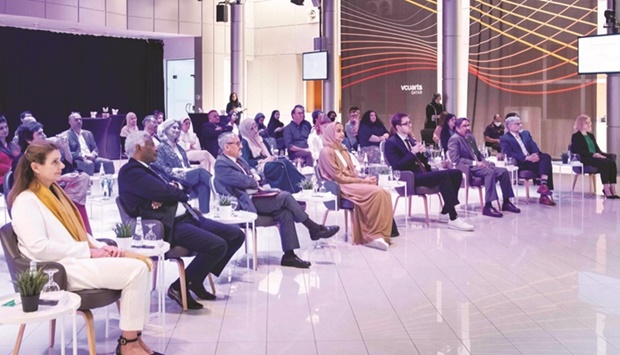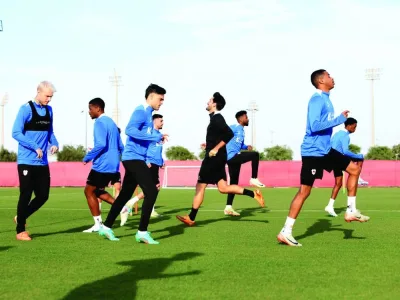Virginia Commonwealth University School of the Arts in Qatar (VCUarts Qatar) recently launched the VCUarts Qatar Institute for Creative Research, which is the country’s, and one of the region’s, first university-level institutes dedicated to advancing creative research.
HE Sheikha Hind bint Hamad al-Thani, vice-chairperson and CEO of Qatar Foundation (QF), and Dr Sriram Rao, vice president for research and innovation, VCU, Richmond attended the event.
Also, in attendance were Francisco Marmolejo, president of Higher Education at Qatar Foundation; Dr Hisham Sabir, executive director (Interim), Qatar National Research Fund (QNRF); Riham Daher, director of programmes administration, QNRF; Lisa Ballance, associate vice president for strategy and regulatory affairs, VCU, Richmond; Amir Berbi?, dean, VCUarts Qatar; and other senior leadership, chairs and faculty from VCUarts Qatar’s research, academic and administrative departments. Dr Rao, made the official announcement of the institute.
Also, in attendance were Francisco Marmolejo, president of Higher Education at Qatar Foundation; Dr Hisham Sabir, executive director (Interim), Qatar National Research Fund (QNRF); Riham Daher, director of programmes administration, QNRF; Lisa Ballance, associate vice president for strategy and regulatory affairs, VCU, Richmond; Amir Berbi?, dean, VCUarts Qatar; and other senior leadership, chairs and faculty from VCUarts Qatar’s research, academic and administrative departments. Dr Rao, made the official announcement of the institute.

The four goals of the institute are: to partner with local industry for increased community engagement; increase awareness of societal impacts and contributions of creative research; support multi-disciplinary collaborations with partner institutions from within Education City and the VCU campuses in Richmond; and support human capacity development in creative research in Qatar.
“On behalf of president Michael Rao and the leadership of VCU, I want to offer my congratulations to you all on today’s announcement that VCUarts Qatar is going to be home to the first university-level Institute for Creative Research in the entire country,” Dr Rao, said.
He continued: “This is no small feat. To become designated as a VCU-wide institution or centre means undergoing extensive, critical, and competitive review on the main campus in Richmond. The mission of such a proposed institute must align with the university’s mission and overall critical priorities, what we refer to as a ‘one-VCU’ strategic research priority.
“To be designated a VCU centre, is a tall order. It has to be transdisciplinary; it has to foster a culture of collaboration; and its goals and vision have to stretch beyond individual goals. Only a handful achieve this designation. I know, the impact of this research that will take place in this Institute for Creative Research will be felt beyond Qatar and abroad. It will be global.”
Francisco Marmolejo, president of Higher Education at QF, said: “This new and exciting institute is aligned with the strategic priorities for multiversity integration and collaboration that Qatar Foundation has at the core of its purpose. We look forward to the contributions that will be made through this work to Qatar Foundation’s commitment to unlocking human potential.”
The institute’s governing operations will be led by Dr Diane Derr, associate dean for research and development.
Dr Derr said: “The unique structure of the institute, comprised of faculty-led research labs, will advance research, scholarship, and creative practice in Qatar, through experimental, exploratory, and traditional forms of inquiry. The teams of faculty, students, and alumni will make impactful contributions to Qatar’s creative economy and the vibrant research enterprise of Qatar Foundation.”
The institute is made up of faculty-led research labs. Together, these labs at VCUarts Qatar explore areas as diverse as nanotechnology, product design and development, data processing, computation, and sound design, to transformative pedagogy, cultural preservation, and Arabic typography.
Each lab supports in-depth investigations by teams of faculty, students, and alumni, and enhances community engagement and impact. The labs provide students with hands-on experiential learning, and recent alumni with valuable professional development.
Dean Berbi? added: “Today, VCUarts Qatar became home to the first Institute for Creative Research in the country and the region.”
“This is not only an achievement, but also a well-earned progression for a School of the Arts and branch campus of a public R1 institution that has always recognised the value and impact of creative research on society.”
The institute is made up of faculty-led research labs. Together, these labs at VCUarts Qatar explore areas as diverse as nanotechnology, product design and development, data processing, computation, and sound design, to transformative pedagogy, cultural preservation, and Arabic typography.
Each lab supports in-depth investigations by teams of faculty, students, and alumni, and enhances community engagement and impact. The labs provide students with hands-on experiential learning, and recent alumni with valuable professional development.
Dean Berbi? added: “Today, VCUarts Qatar became home to the first Institute for Creative Research in the country and the region.”
“This is not only an achievement, but also a well-earned progression for a School of the Arts and branch campus of a public R1 institution that has always recognised the value and impact of creative research on society.”



